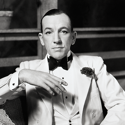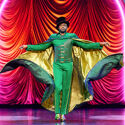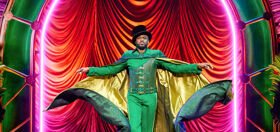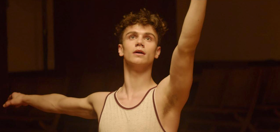 This is not the story of a gay marriage poster couple. There’s no matching tuxedos, no wedding rings and one of the grooms hates the word “husband” with a passion. Malik Gaines and Alexandro Segade are not what you would call your average married couple, if there is such a thing. For one thing, they’re performance artists and co-founders of the Los Angeles-based “My Barbarian,” a group that combines disparate elements like Plato, Wiccan rituals and the films of Kenneth Anger and mixes them together with the occasional splashy musical number. And another thing: They’re not terribly comfortable with the whole idea of marriage, really.
This is not the story of a gay marriage poster couple. There’s no matching tuxedos, no wedding rings and one of the grooms hates the word “husband” with a passion. Malik Gaines and Alexandro Segade are not what you would call your average married couple, if there is such a thing. For one thing, they’re performance artists and co-founders of the Los Angeles-based “My Barbarian,” a group that combines disparate elements like Plato, Wiccan rituals and the films of Kenneth Anger and mixes them together with the occasional splashy musical number. And another thing: They’re not terribly comfortable with the whole idea of marriage, really.
This is a couple that throws phrases like “heteronormative” and “queer identity” out around the dinner table. “We both have some hesitancy about the terms of the political debate about marriage, because it seems very much arranged around property and equal bourgeois participation and structures that aren’t always liberatory in the first place”, says Gaines, adding, “And since we don’t have property, we don’t have children, none of that seemed that important. But the statement of sort of doing it, to make this transformation of the law into a real thing that real people are doing, seemed important. We wanted to take the moment and enter into the state-sanctioned version of this relationship.”
When the California Supreme Court ruled that gay marriage was a fundamental right last May, the couple, who have been together since 1991, decided to tie the knot and were married in mid-September. Like thousands of gay Californians who married last year, the future of their marriage will be debated before the seven justices of the California Supreme Court this week—and though they still are ambivalent about the idea of marriage, when it comes to their own, they’d very much like to keep it, thank you.
What makes the marriage of Malik and Alex so interesting is that they’re not your typical gay couple. One of the ongoing arguments within the gay community is why gays and lesbians would want to recreate the sometimes boring white-picket fence, 3.2 kids world of straight marriage. You get a sense that this is a conversation Malik and Alex would love to have with you.
How about we take this to the next level?
Our newsletter is like a refreshing cocktail (or mocktail) of LGBTQ+ entertainment and pop culture, served up with a side of eye-candy.
In fact, Alex will be presenting a performance and video-based work about marriage at UCLA that will open the same day as the court hearing. For them, marriage is as much about politics and art as it is about love, which means their marriage is by no means, traditional. When asked how marriage has changed his life, Gaines says:
“I’d have to say that since then – how to put this in a polite way? – like many gay men, we have certain ways of behaving in our relationship that allow for certain kinds of creative expression.” He takes a minute to laugh, then says, “And I think, somehow, after getting married, I’ve thought twice about fooling around. And I didn’t expect that it would make any difference and I don’t know if Alex thought it would make any difference. It’s not like we’re sluts. We have a very tame extra-sexual situation, but yeah, after the wedding, I sort of thought, ‘Well, wait, I’m married!“
Suffice it to say, it’s unlikely gay rights organizations will be using Alex and Malik as marriage poster boys anytime soon, but they’re forging a new idea of marriage that is uniquely their own. It’s a union that reflects the fact they’ve been together since they were freshman in college, that they’ve, as Alex puts it, “given marriage presents to couples that have since broken up,” and yet still don’t get an automatic invite for their partner at dinner parties. They don’t even have rings yet. But in its improvisational nature, their marriage is refreshingly honest. Ironically, they had performed gay marriage ceremonies in their work, but as Segade says, when he found himself down at the East L.A. County Courthouse, committing for real, the weight of their marriage hit home:
“Once you’re standing across from the other person you’ve been with all this time, you’re listening to some weird justice of the piece person telling you, ‘This is very important’ and ‘Here’s the vows’ and you have to say them and it’s not to be taken lightly and all this stuff and it really does feel serious and very much that you’re a part of society in a way that you aren’t when you’re making a crazy performance art piece … You really do feel like you can participate in a way that I haven’t really experienced in terms of my relationship with Malik. Even though we’ve been fine and we’ve suffered very little compared to what a lot of people have suffered because of their sexual orientation or relationships they’re in … you really do feel like a part of society. You get a real marriage license with all the curly script and weird paper and everything and it does make you feel like you can be a part of things.”
 Segade mentions that many of the older queer artists he worked with didn’t want to get married, even though many of them have been in decades long relationships. “One of them confessed to me that [the reason they didn’t want to get married] is because they knew that it was going to get voted against, that Prop. 8 would pass and they didn’t want to deal with the heartbreak or the sense of embarrassment or the whole kind of agonizing distrust. … They just didn’t want to be voted on… I found that interesting because in our case, it was almost the opposite. We knew there was going to be some kind of battle and we knew we were exactly the sort of people who should be involved in it, so we are.”
Segade mentions that many of the older queer artists he worked with didn’t want to get married, even though many of them have been in decades long relationships. “One of them confessed to me that [the reason they didn’t want to get married] is because they knew that it was going to get voted against, that Prop. 8 would pass and they didn’t want to deal with the heartbreak or the sense of embarrassment or the whole kind of agonizing distrust. … They just didn’t want to be voted on… I found that interesting because in our case, it was almost the opposite. We knew there was going to be some kind of battle and we knew we were exactly the sort of people who should be involved in it, so we are.”
But both Alex and Malik admit that one of the driving forces of their marriage wasn’t an exotic force at all. It was their parents. Segade says, “It became a really big deal for [our parents]. And that’s one of the ways you see how you can’t just create new institutions out of nowhere. You kind of have to work with what’s available and marriage means something to our parents. In the end, that’s what made it happen. It’s what made it feel special, even though we did a civil ceremony.” Gaines mentions that even though both sets of parents were close before the marriage, the wedding “cemented” the bonds and now the two mothers often chat “without even letting us know.”
“How would gay rights ever win a popular vote at this point? That’s ridiculous. And you know, minority rights shouldn’t be up for a popular vote. Like everything else about our stupid California initiative system, this is just one more example of why it shouldn’t function.” Both Gaines and Segade fault the loss partially on the No on 8 campaign, as well as a perceived sense that the gay community didn’t want to make the issue a liability for Obama, but when it was announced that Prop 8 passed, they both took it personally. Gaines says, of the hearing this week:
“It’s disturbing. We both moved to L.A. in the 90s, when there was this sort of queer underground, this sort of outlaw position, you know? There’s something productive about being in that outlaw position of resistance that I’m not really afraid of. There’s something good about that… If they outlaw our marriage, that doesn’t mean our identities stop being productive, but yeah, it’s irritating. One imagines one day it will all reverse itself in the due course of history, but who knows what will happen now?”



















Sebbe
It is nice to see how this is affecting an nontraditional same sex couple (wait does that even make sense?). In any case, thanks for the article, it was well done and insightful.
Jason
“minority rights shouldn’t be up for a popular vote”
Damn straight (queer?)
Minority rights should be GIVEN, not debated. How fucked up is this?
atdleft
@Jason: Very! The Supremes really need to be thinking about that. And hopefully with more “nontraditional” couples (but are any of us really “traditional”?) coming out as married or hoping to be married, this will put to an end the naysayers in our own community telling us to “chill the f**k out” over being second-class citizens.
BabaGanush
I personally really reacted to the personal changes in ‘playing around’, because that was our experience also. We have always enjoyed our bodies, and our contacts with others.. and refused to try to pretend that we are Ward And June. And we still aren’t puritans.. but the fact that we are now “married” really makes you think, “maybe I don’t want to mess around anymore”. Or maybe I am just getting old… I don’t know. But this is REALLY what the anti-marriage people are afraid of. If we can get married, and act married, then they can’t call us heathen perverts anymore. (though many of my best friends are heathen and perverts!lol)
Freeman
For the record, labeling this marriage as unconventional seems a bit unnecessary. I personally don’t know a single monogamous gay couple other than my own relationship. My boyfriend and I are often frowned upon for being monagomous by other gays, particularly other gay couples. It seems to me that non-monogamy is much more conventional and supported by the gay community, regardless of whether the couple is married.
Nick
They look damn good for their mid-thirties.
joseph
@Freeman
“Malik Gaines and Alexandro Segade are not what you would call your average married couple… For one thing, they’re performance artists and co-founders of the Los Angeles-based “My Barbarian,” a group that combines disparate elements like Plato, Wiccan rituals and the films of Kenneth Anger and mixes them together with the occasional splashy musical number. And another thing: They’re not terribly comfortable with the whole idea of marriage, really.”
The reason he was saying they’re not “traditional” was not because of the openness of their relationship. In fact, that was a very secondary point brought up in a quote by one of the two men in the relationship and not handled in the article by the writer at all… please take your personal problems with the larger Gay Community elsewhere..
Freeman
Joseph- did you even read the article? The article deals directly with marriage as it relates to tradition (i.e. heteronormative monogamy). Just because these two guys are performance artists, and we know how untraditional it is for two gays to be performance artists….doesn’t solidify their marriage as untraditional.
This wasn’t an attempt for me to air my larger issues with the gay community, but I certainly will do it here if I so please. How about you re-read the article and we’ll go from there.